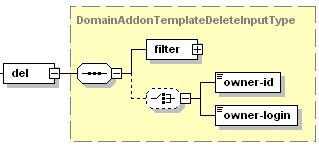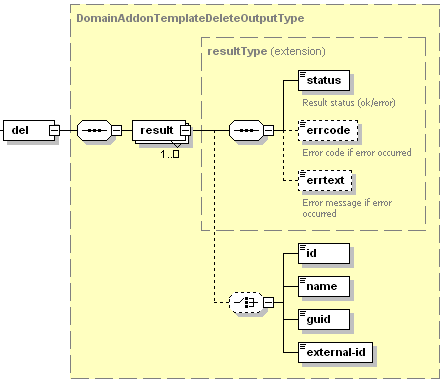Deleting Add-on Plans
The del operation is used to remove add-on plans.
Request Packet Structure
A request XML packet deleting add-on plans includes the del operation node:
<packet>
<service-plan-addon>
<del>
...
</del>
</service-plan-addon>
</packet>
The del node is presented by type
DomainAddonTemplateDeleteInputType (domain_template.xsd). Its
graphical representation is as follows:

Note: The interactive schema navigator for all request packets is available here: http://plesk.github.io/api-schemas/1.6.9.1/agent_input.svg.
- The filter node is required. It serves to specify the criteria
by which the necessary add-on plans will be deleted from the
database. Data type: DomainTemplateFilterType
(
domain_template.xsd). For details on the criteria, see the Available Filters section. - The owner-id node is optional. It specifies the ID of the add-on plan owner. Data type: integer.
- The owner-login node is optional. It specifies the login name of the add-on plan owner. Data type: string.
Note: When creating request packets, put nodes and elements in the order they follow in the packet structure.
Response Packet Structure
The del node of the output XML packet is of type
DomainAddonTemplateDeleteOutputType (domain_addon_template.xsd)
which has the following presentation:

Note: The interactive schema navigator for all response packets is available here: http://plesk.github.io/api-schemas/1.6.9.1/agent_output.svg.
- The result node is required. It wraps the result of the del
operation for a single add-on plan. Data type: resultType
(
common.xsd). - The status node is required. Specifies the execution status of the del operation. Data type: string. Allowed values: ok | error.
- The errcode node is optional. Is required if the del operation fails. Returns the error code. Data type: unsignedInt.
- The errtext node is optional. Returns the error message. Data type: string.
- The id node is optional. If the request packet fails before the execution, this node is missing in the response packet. In all other cases it holds the identifier of the add-on plan (if this ID was specified in the request packet). Data type: integer.
- The name node is optional. If the request packet fails before the execution, this node is missing in the response packet. In all other cases it holds the name of the add-on plan (if this name was specified in the request packet). Data type: string.
- The guid node is optional. It holds the GUID of the add-on plan. Data type: string.
- The external-id node is optional. It holds the ID of the add-on plan in the Panel components (for example, Business Manager). Data type: string.
Deleting add-on plans that belong to a reseller
To delete plans only from the plan list that belongs to a certain reseller, specify the reseller ID or username.
<packet>
<service-plan-addon>
<del>
<filter>
<name>base_plan</name>
</filter>
<owner-login>JDoe</owner-login>
</del>
</service-plan-addon>
</packet>
Response:
<packet>
<service-plan-addon>
<del>
<filter>
<id>11</id>
</filter>
<owner-login>JDoe</owner-login>
</del>
</service-plan-addon>
</packet>
Deleting add-on plans that belong to the Administrator
To remove plans from the Administrator’s plan list, omit reseller identifiers:
<packet>
<service-plan-addon>
<del>
<filter>
<name>base_plan</name>
</filter>
</del>
</service-plan-addon>
</packet>
Response:
<packet>
<service-plan-addon>
<del>
<result>
<status>ok</status>
<name>base_plan</name>
</result>
</del>
</service-plan-addon>
</packet>
Deleting multiple add-on plans
A single filter can specify multiple plan instances for deletion, all defined either by ID or by the plan name:
<packet>
<service-plan-addon>
<del>
<filter>
<name>first_plan</name>
<name>second_plan</name>
</filter>
</del>
</service-plan-addon>
</packet>
Response:
<packet>
<service-plan-addon>
<del>
<result>
<status>ok</status>
<name>first_plan</name>
</result>
<result>
<status>ok</status>
<name>second_plan</name>
</result>
</del>
</service-plan-addon>
</packet>
To delete plans that belong to different Plesk users, use a separate del operation for each:
<packet>
<service-plan-addon>
<del>
<filter>
<name>base_plan</name>
<name>quick_plan</name>
</filter>
</del>
<del>
<filter>
<id>52</id>
<id>53</id>
</filter>
<owner-login>JDoe</owner-login>
</del>
<del>
<filter>
<id>66</id>
<id>67</id>
</filter>
<owner-id>12134</owner-id>
</del>
</service-plan-addon>
</packet>
The following packet deletes all add-on plans belonging to reseller JDoe:
<packet>
<service-plan-addon>
<del>
<filter/>
<owner-login>JDoe</owner-login>
</del>
</service-plan-addon>
</packet>
The following packet deletes all add-on plans that belong to the packet sender:
<packet>
<service-plan-addon>
<del>
<filter/>
</del>
</service-plan-addon>
</packet>